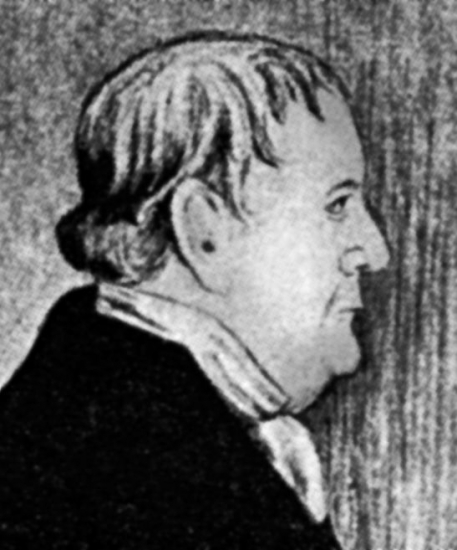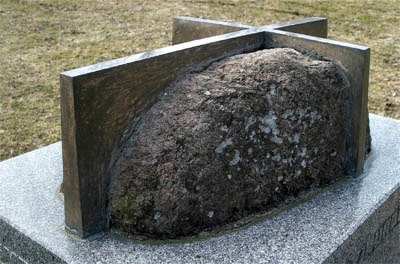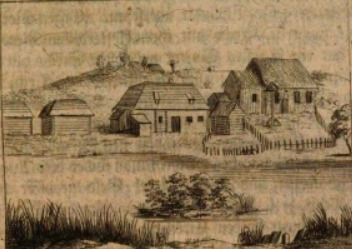Gustav Bergmann
08.04.1749 – 12.07.1814
Gustav von Bergmann (1749-1814) - a Baltic German pastor, writer, translator, historian, doctor without license, bibliophile, who was interested in nature, space, agriculture and many other fields. He represents the movement of "moderate" Enlightenment. Rationalist. Collector of Latvian folk songs, publisher of the first Latvian folk song editions.
Birth time/place
08.04.1749
Ādažu mācītājmuiža
Place/time of death
12.07.1814
Rūjienas mācītājmuiža
Mācītājmuižas vietā izvietots piemiņas vieta Bergmaņu dzimtai.
Personal information
Father – Balthasar Bergmann (1672-1751) – pastor in Ādaži (in German: Neuermühlen) parish, wrote catechism while working in Skujene (in German: Schujen).
Mother – Anna Elizabeth (1712-1784) was a granddaughter of the poet and linguist L. Depkin.
There were 12 children in the family, several of whom left traces in the development of Latvian culture: Balthasar Bergmann (1736-1789) – lawyer, counselor, writer, freemason;Ambrosius Bergmann (1740-1784) – physician; Liborius Bergmann (1754-1823) Lutheran pastor, historian, writer, mason. Gustav Bergmann was the 8th child and since the family paid serious attention to the education of children, they were taught by private tutors from a very young age. This experience later made Gustav Bergmann express critical remarks on punishment as a motivator for learning.
After studying in Germany, Gustav Bergmann returned to Livonia and, following family traditions, joined the Masonic lodge in Riga where he met J.Ch.Brotze, who later wrote a paper on the history of Livonia.
In his youth, G. Bergmann enjoyed hunting so much that used to take a shotgun even when visiting the dying people for last sacrament.
August 12, 1771: G. Bergmann married Beata Elisabeth Meder (1753- 1827), the daughter of the former Āraiši (in German: Arrasch) pastor. They had 10 children, the most famous of whom were: Benjamin Fürchtegott Balthasar von Bergmann (1772-1856) – Lutheran pastor, ethnographer, historian, linguist; Hermann Johann Jacob Bergmann (1780-1856) – Lutheran pastor; Heinrich Eberchard Bergmann – officer in the army of Russian Empire.
1787: appointed to the nobility
1812: rapid deterioration of health: chronic diseases of kidneys, asthma, gradual loss of memory, which led to retirement from pastor's duties at the end of 1813
1814: died after a long illness
Professional activity
Priest
1771: passed the exams and was ordinated for pastor
1807: assesor to the Oberconsistorium of Vidzeme Lutheran church.
Paid great attention to the issues related to peasant education.
Literary work
Books1772: wrote and published his first book in Latvian "Lessons for Christianity" (in Latvian: Kristīga ticības mācība). It became so popular that it was republished 3 times (1786, 1787, 1803).
1776: "Geschichte von Livland: nach Bossuetischer Art entworfen". Inspired by J.Ch. Brotze.
1777: "Sacred stories from the scenes of the times of Old and New Testament (in Latvian: Svēti stāsti no tiem notikumiem vecās un jaunās derības laikos) that was based on the example of "Little Bible" by G.F.Stender. The book consists of 46 stories with a didactic comment at the end of each. Reprinted in 1786 and 1794
1785:"Sammlung Livlandischer Provinzialworter"
1789: Collection of Paternosters.
1791-1880: continued the work of pastor Chr. Harder, edited and published the "Vidzeme Calendar (In Latvian: Vidzemes kalendārs)
1795: "Lessons to be received on Sundays, Festivities and Sacral times" (in Latvian: Saņemamas sprediķu mācības uz visām svētdienām, svētkiem un svētiem laikiem)
Many occasional publications, e.g., poems for anniversaries of nobles and family members, wall calendars, etc.
Publications in Folklore
One of the sources of folk song corpus, which were sent to J.G. Herder in the 1770ies.
1807: compiled and published the first Latvian folk song collection "Erste Sammlung lettischer Sinngedichte" with 238 texts of folk songs, folk romances and popular songs (ziņģes)
1808: compiled and published the second Latvian folk song collection "Zweite Sammlung lettischer Sinn-oder Stegreifs Gedichte" with 248 texts of folk songs, folk romances and popular songs (ziņģes) and 3 riddles
1808: published the collection of the Palsmane priest F.D. Wahr "Palsmane Folk Songs" (in Latvian: Palcmariešu dziesmu krājums) with 413 folk songs
Translations
1787: "Latvian hymnal" (in Latvian: Latviska dziesmu grāmata). Together with other Livonian priests prepared 29th edition of the Vidzemes' Lutheran hymnal
1791: "Book of good knowledge and advice for Vidzeme people" (In Latvian: Labu ziņu un padomu grāmata, vidzemniekiem par labu taisīta)
1794: 3rd translation of the Bible. Prepared in collaboration with several priests. Wrote a preface and edited more than 1000 pages
1809: "Christian songs to be sang in the Vidzemes' churches and homes" (In Latvian: Kristīgas dziesmas, Vidzemes baznīcās un mājās dziedamas) prepared by collective of authors. G. Bergmann edited 88 songs of G.F. Stender, translated 15 from German and composed 6
Reprinted several important works in literature and history, e.g. "History of Livonia" by Dionisius Fabricius, poem "Henriade" by Voltaire, a.o.
Manuscripts
Fragments for Latvian grammar, where he tried to create new terminology in the field of grammar.
1776: "Von den lebensart un Leibeigenshaft der heutigen Läten". Ethnographic description, illustrates the views of G. Bergmann in his youth.
1796: "Die Letten vorzüglich in Lieflan, am Ende des philosophischen Jahrhunderts." Written as a reply to the book of Garlib Merkel. There is a note on manuscript "Not for publishing".
1797: "Kurze Würdigung der Merkelschen Schrift" thoughts on lifting the serfdom and on G. Merkels' ideas.
1805: "Book of Rhymes" (in Latvian: Atskaņu grāmata), which reflects on the search for rhymes for the translations of new songs.
1806: Dictionaries: Latvian–German in 1 volume; German-Latvian in 2 volumes. These dictionaries later were used in dictionary of K.K. Ulmann in 1872.
1809: "Sammlung Lettischer sinn-oder-stegreifs gedichte, wörtlich übersetzt von dem sammler, Gustav Bergmann, für Herrn Robert Jamieson". Translations of Latvian folk songswith comments and explanations.
Social activities
Having no doctor's licence, he helped as a medic to the people of his parish. He vaccinated more than 8000 children against pox using the adapted method. (I.e. vaccine against the pox is diluted with water 1:1. This approach decreased death rate among vaccinated population.) After examination the Russian Medicine Collegium suggested to use this method for doctors.He used to prepare essences on the bases of alcohol and herbs to cure different diseases.
Honours and awards
1787: G. Bergmann was appointed to nobility1802: was awarded golden medal by Alexander I in gratitude for vaccination against the pox
1806: elected honoured member of the Moscow Society of Devotees of Natural Science
Quotes
Childhood memories
"Now, when I write this approximately 20 years later, I still nightdream that I am dragged out of my bed, beaten, pulled by hair, because used feminine form instead of masculine of mixed Nominative with Accusative. [..] My childhood was depressive, because I spent so much time in the arms of these teachers that I lost all senses of sincerity."
Memories of G. Bergmann. Quoted from Bergmann E. Von unseren Vorfahren. Berlin, 1896, p. 141.
View on lifting the serfdom as expressed by G. Bergmann's literary characters:
Prāve Krišs: "Not earlier than when people adopt a wiser life style, give up alcohol, drinking and laziness, will we see the freedom in this land."
Ārgalvju Mačs replies: "If we receive this freedom, then starvation, poverty, burglary, murders and insecure life are to be expected."
Bergmann G. Labu ziņu un padomu grāmata. Rūjiena, 1791.
Brother Ambrosius, replying on Gustavs' composed poem, 1777:
"Rhymes are great, however I can't understand a single word. Thoughts are moving here and there. A turkey also could compose a poem if he wouldn't have thoughts."
Švābe A. Kāda mācītāja dzīve. Stokholma, 1958., 16. lpp.
Priest of Piebalga (in German: Pebalg) Chr. Girgenson on the preparation of the song book that they created together, he edited texts prepared by G. Bergmann:
"In some of them I had to change each line. I'm very strict in my feedback, however he [G. Bergmann] would say that I'm doing this in order not to allow appear any other song except mine. I let him judge me on the same level of severity!... Sometimes he is correct in his comments; although often they are contradicting not only mine, but also the thoughts of Harders' that are decisive in this case. Often reading his remarks I'm wondering: where was he looking? "
Švābe A. Kāda mācītāja dzīve. Stokholma, 1958., 61. lpp.
G. Bergmann replying to the highest nobility prohibition for him to buy the manor of Ķirbeļi, use the carriage and call his daughters fraulains:
What are superiors doing,
They' re working without understanding,
They eat and bite my people here
As mouthfulls of the bread.
Themselves they come from profligates
That change the words of God
They're using sacred words in speech
To cover imposition...
[Ko dara daži priekšnieki,
Tie nestrādā ar ziņu,
Tie manus ļaudis ēd un rij
Kā maizes kumosiņu.
Tie paši ir no netikļiem,
Kas Dieva vārdus groza –
Ar savu vārdu svētumu
Tie apklāj blēdību...]
Rūja V. Dainas ir šīs tautas domāšanas un jušanas veids. Pirmajam mūsu tautasdziesmu izdevējam Gustavam Bergmanim – 250. Latvijas Vēstnesis Nr. 116-118, 16.04.1999.
Affinities
Benjamins Firhtegots Baltazārs Bergmanis - Son
Liborijs Bergmanis - Brother
Education
1763–1767
Veimāras klasiskā ģimnāzija
Veimāra
10.10.1767–10.03.1770
University of Leipzig
Ritterstraße 26, Leipzig
Leipcigas Universitātē studē teoloģiju. Rektors J.H. Vinklers, kas lasa filosofiju un fiziku, modina interesi par dabaszinātnēm. Pasaules uzskatos ļoti ietekmējies no teologa un izcilā vācu latīnista J.A. Ernestī, kas pretstatā toreiz valdošajam svēto rakstu dogmatismam un alegoriskam tulkojumam, izteica domu, ka tie, pirmkārt, būtu jāskaidro ar filoloģiski vēsturisko metodi, tā pavērdams ceļu racionālismam. G. Bergmans dzimtas kopāsanākšanās mēdzis stāstīt par to, kā studiju laikā duelī uzvarējis ar dižo vācu dzejnieku J.V. Gēti, ievainojot to rokā. Duelis noticis, jo kādas teātra izrādes laikā J.V. Gēte adresējis jauno studentu virzienā vārdus: "Šeit smird pēc fukša!", uz ko G. Bergmans atmaksājis ar pļauku.
Working place
1770–1771
Krimuldas pagasts
Mācītāja kandidāta gads. Sprediķo latviski pie svaiņa Pelchava Krimuldas draudzē.
06.1771–1780
Āraišu draudze
Āraišu Evaņģēliski luteriskā baznīca
No Bergmaņa atmiņām zinām, ka mācītājs centās dzīvot mierīgu, bezrūpīgi idillisku dzīvi. Āraišu ezera salā viņš uzbūvēja sev būdiņu, kur pavadīja dienas un naktis, lasīdams savu mīļāko grāmatu "Robinsons Krūzo". Viņa vientulīgo un pirmatnīgo dzīvi Bergmans centās atdarināt un pēc šī darba viņš sprieda arī par Baltijas tautu kultūras līmeni 12. gadsimtā. Zīmējums ar salu ievietots G. Bergmana "Geschicthe von Livland".Kalpodams Āraišos, G.Bergmans mācās literāro latviešu valodu, par avotiem izmantodams Fīrekera un Manceļa darbus, kā arī E. Glika Bībeles tulkojumu. Jau šajā laikā iestājies pret hernhūtiešu misticismu un piētismu.
1780–1785
Mazsalacas Sv. Annas evaņģēliski luteriskā draudze
Mazsalacas Sv. Annas luterāņu baznīca
Ap 1782. gadu ierīkoja mājas spiestuvi, kas vēlāk pārcelta uz Rūjienu. 1787. gadā pēc iecelšanas muižnieku kārtā un palielinoties kontaktiem ar konservatīvi noskaņotajiem vietējiem muižniekiem Zīversiem, izmainās G. Bergmaņa attieksme pret zemnieku brīvlaišanu, nosliecoties vairāk tās opozīcijā. Organizējis "lasīšanas biedrību", tā piegādājot ārzemju grāmatas vietējiem muižniekiem. Aktīvi cīnījies pret pagānismu: ne tikai rakstos un sprediķos, bet arī darbos. Mazsalacas topogrāfiskā aprakstā Bergmanis raksta: "Viņi iežogo kādu vecu koku vai krāsmatu un ziedo tur Zemes mātei, paraksti Jurģos, pienu, sviestu, cāļus; dažreiz arī melnu gaili. Šos ziedokļus uzskata par ļoti svētiem – pār;ec pār žogu, pārbrauc ar arklu, nolauž kādu zaru vai nocērt koku, notiek nelaime: viņš pēkšņi mirst, kļūst akls vai mēms." Par šo viņš savai draudzei pārmetis vairākkārt sprediķos. Reiz pie viņa ieradies kāds emnieks un stāstījis, ka viņa senči tam uzticējuši kopt šādu vietu. Pēc sprediķiem zemnieks beidzis upurēt, par ko sieva un saime tam nemitīgi pārmetuši, jo tas var izsaukt nelaimi mājai. Bergmanis kopā ar zemnieku esot devies uz šo vietu, noplēsis žogu, mājas ļaudīm draudot, iegājis svētajā iežogojumā, kur apskatījis upura akmeni, palūdzis cirvi un sācis robīt svēto koku, ko beigās aizdedzinājis. Redzot, ka mācītājam nekas nekait, ļaudis apkaunoti devušies mājās.
1785–12.1813
Rūjienas Sv. Bērtuļa evaņģēliski luteriskā draudze
Rūjienas Svētā Bērtuļa evaņģēliski luteriskā baznīca
Uz Rūjienu pārceļas finansiālu apsvērumu dēļ, jo lielā ģimene, bērnu izglītošana prasa lielus līdzekļus. Lai gūtu papildus ienākumus, mēģinājis spekulēt ar neustamo īpašumu, bet šai jomā nav veicies, jo viņam nebija matrikulēta muižnieka statusa.Turpina literāta un izdevēja darbu. PIrmais Rūjienā iespiestais darbs ir vācu almanahs 1786. gadam, kurā G. Bermans nav iekļāvis daudzas katoļu svēto piemiņas dienas, tā vietā pievienojis dienas, kas saistītas ar jaunām vēsturiskām personām: rakstniekiem, zinātniekiem u.c.Mācītāja bilbiotēkā 1788. gadā bija 827 sējumi, to starpā 63 grieķu, 231 latīņu klasiķis, 142 gramatikas un vārdnīcas, reta bībeļu kolekcija, 32 inkunabuļi, Livonijas hroniku noraksti u. tml. Paralēli mācītāja pienākumiem, iesaistījies dažādās Virskonsistorijas aktivitātēs, piemēram, jaunas dziesmu grāmatas sagatvošanā u. tml. 1812. gadā veselības problēmu dēļ Virskonsistorija ļauj viņam doties atpūtā.
Participation in organisations
1771
„Zum Schwerdt“
Daniela Bāka nams
Brīvmūrnieks1785: Brāļa statuss1790: 4.grāds
1811
Latviešu biedrība
There is a view that G. Bergmann was one of the authors for idea to found the "Latvian Society" (Latviešu biedrība).
1811–1814
Lettische Gesellschaft
Vidzeme
Viens no biedrības dalībniekiem, pēc Āronu Matīsa domām, tās idejas autors, par to sīkāk: Āronu Matīss. Latviešu Literāriskā (Latviešu Draugu) Biedrība savā simts gadu darbā. Rīga: A.Gulbis, 1929, 100. lpp.
Buried
1814
Rūjienas Sv. Bērtuļa evaņģēliski luteriskā draudze
Ternejas parks








